Virgin Orbit launch – as it happened: UK rocket ‘burns in atmosphere’ as failure casts doubt over future missions
The UK’s first-ever space mission has failed after “an anomaly” prevented the Virgin Orbit rocket from reaching orbit.
The rocket and the nine satellites it was carrying, reportedly burned up in the atmosphere after the launch failed.
It was projected to land over water, but burned up in Earth’s atmosphere on reentry, according to New Scientist.
Shortly before midnight, an official on the live stream announced the rocket suffered an “anomaly” that meant it failed to reach orbit.
The launch was an opportunity for Virgin Orbit to show its investors what it was capable of, but the failure has led to its tanking as much as a third in after-hours trading and is set for a $200m fall.
The launch was set to be the first-ever rocket launch from UK soil, as well as the first time that satellites have been launched from Europe.
Virgin Orbit’s unusual system sees a plane carry the rocket up to 35,000 feet, before dropping it off to carry its satellites into space.
Key Points
UK space mission fails
Small seaside town awaits western Europe’s first ever satellite launch
UK Space Agency excited for launch
SpaceX capsule undocks from International Space Station
Monday 9 January 2023 22:50 , Andrew Griffin
Elsewhere in space, a SpaceX capsule has just detached from the International Space Station and is on its way back down to Earth.
Undocking ➡️ COMPLETE
At 5:05pm ET, @SpaceX’s Cargo Dragon undocked from the @Space_Station for its return to Earth.
After splashdown on Jan. 11, @ISS_Research will be brought to Kennedy Space Center and returned to the hands of researchers: https://t.co/GjYJu8nOhr— NASA's Kennedy Space Center (@NASAKennedy) January 9, 2023
Monday 9 January 2023 22:54 , Andrew Griffin
Here’s another view of the plane on a map. Looks like it’s moving into its “race track”, where it’ll go round and round a little to ensure it’s ready to “drop” its rocket. Just over 15 minutes until that happens.
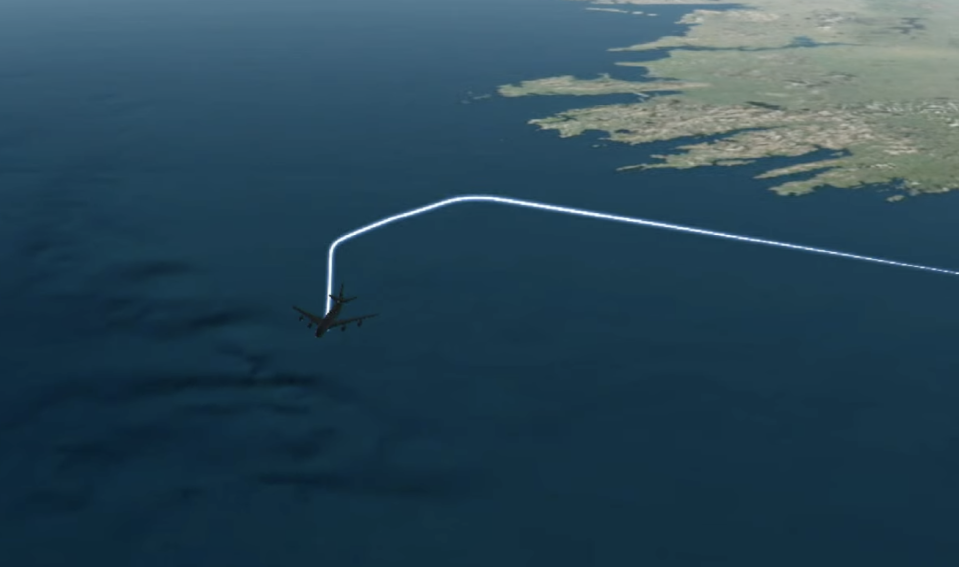
150,000 people track plane as it gets ready to launch
Monday 9 January 2023 22:57 , Andrew Griffin
There are almost 150,000 people tracking the plane as it goes around its “race track”, getting ready for the launch, according to FlightRadar.

It’s by far the most popular plane on the service. And the second plane most tracked plane – with 22,000 people watching it – is a seemingly otherwise unremarkable flight from Madrid to Keflavik in Iceland, which just happens to be going sort of near ‘Cosmic Girl’.
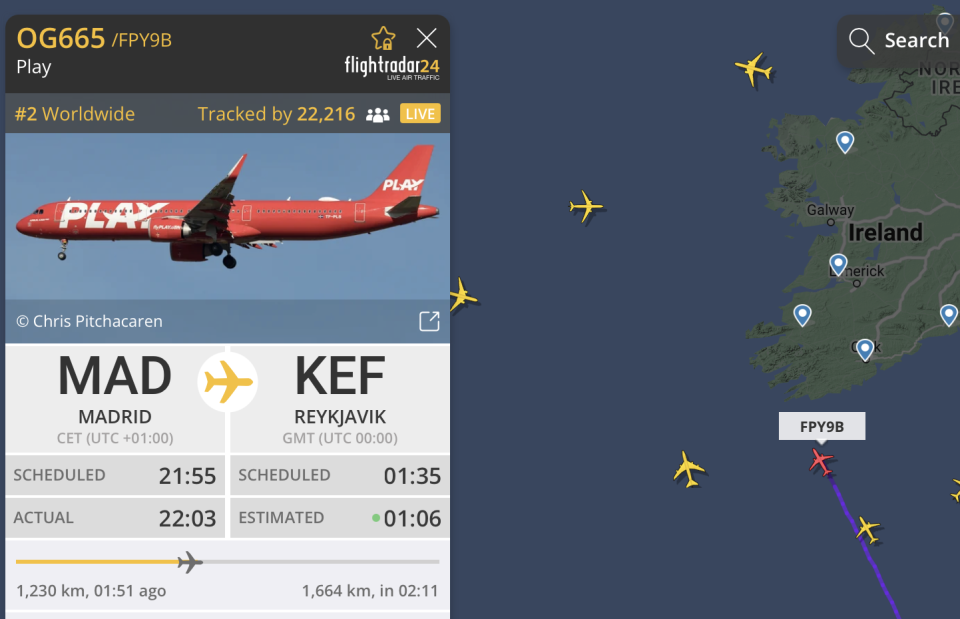
Plane successfully takes off ahead of rocket launch
Monday 9 January 2023 23:02 , Andrew Griffin
Here’s the latest round-up from the Press Association, on everything that has happened before and is about to happen. (There’s about 7 minutes until the “drop”.)
The Virgin Orbit plane carrying the first rocket to launch into space from UK soil has taken off from Spaceport Cornwall.
As the Start Me Up mission lifted off from the runway at Cornwall Airport Newquay, hundreds of people cheered and Start Me Up by the Rolling Stones was blasted out on loudspeakers.
Named in tribute to the Stones’ 1981 hit, the mission involves a repurposed Virgin Atlantic Boeing 747 and Virgin Orbit’s LauncherOne rocket.
The 747, dubbed Cosmic Girl, took off horizontally from the new facility while carrying the rocket under a wing.
Around an hour into the flight the rocket will be released at 35,000ft over the Atlantic Ocean to the south of Ireland.
The plane will then return to the spaceport while the rocket will ignite its engine and take multiple small satellites, with a variety of civil and defence applications, into orbit.
Before the launch, the team behind the historic moment spoke of their immense excitement as they prepared for take-off.
Ian Annett, deputy chief executive at the UK Space Agency, described his “immense excitement”.
“Who would not be excited by the fact this is the first time that it has been done in Europe? That’s because it’s hard,” he said.
“There is a point where the training takes over and you fall into that rhythm of the teams knowing what they need to do.
“They know when they need to make the decisions they need to make.
“I would say the real achievements here are not the successes that you can necessarily see but all of the challenges that collectively as a team people have overcome.
“The culmination of all of that is putting these exciting missions into space. It’s the things at the pointy end of the rocket that really matter.”
Drop to happen any time now
Monday 9 January 2023 23:11 , Andrew Griffin
The “drop ready” time has arrived – the rocket is prepared to drop off its plane and head into space.
Rocket on its way to space
Monday 9 January 2023 23:13 , Andrew Griffin
The rocket has “dropped” and is now burning fuel as it heads up into space.
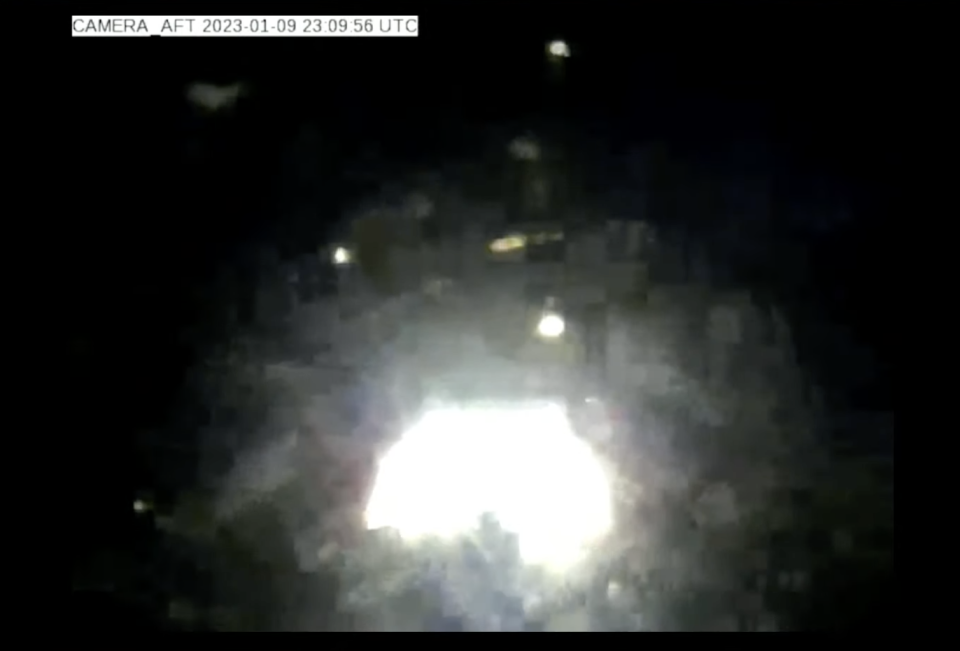
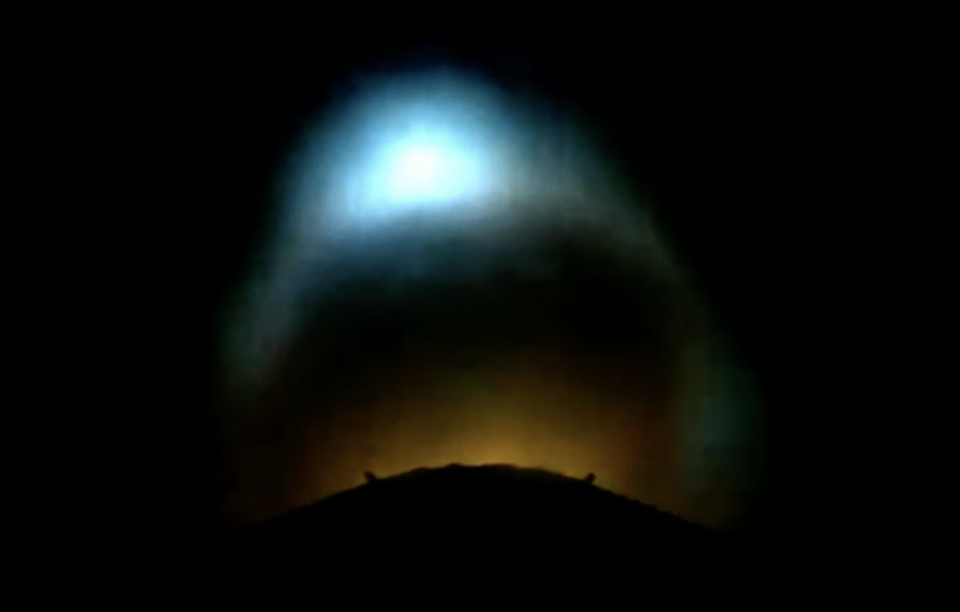
First ever satellite launch from Europe successfully blasts off
Monday 9 January 2023 23:13 , Andrew Griffin
Here’s our full story on today’s successful launch.
Rocket flicking through ground stations as it careens up into space
Monday 9 January 2023 23:18 , Andrew Griffin
The rocket is gradually moving through various ground stations as it sends data back down to Earth. It just switched to Madrid, as it flies south over the globe as well as going upwards.
First burn of second stage complete
Monday 9 January 2023 23:21 , Andrew Griffin
The rocket’s journey is nearing its end. It just finished the first burn of its second stage. It’s got another burn, then that engine will cut off, and then the payload will be deployed and the mission can be declared a success. This bit all happens very quickly.
You can follow all of that live on YouTube here.
(As all this happens, the plane ‘Cosmic Girl’ is making its way back to land in Newquay. Virgin Orbit isn’t really tracking that anymore but you can watch it on FlightRadar here.)
Live stream hit by complaints on YouTube
Monday 9 January 2023 23:28 , Andrew Griffin
The official live stream is currently being hit by a flurry of complaints. The thrust of them is mostly that while the mission might have been a pioneering success, the video of it certainly wasn’t.
Complaints have included everything from the music (it’s true; it’s just one bland piece of music on repeat, which makes you feel like you’re on hold) to technical problems with the video and with glitches. Others just complain it’s boring – especially since there’s very little to see.
Live streams of rocket launches are always hit by complaints of this kind, of course, just like everything on the internet. But they do seem particularly vociferous, here.
‘Cosmic Girl’ about halfway home after groundbreaking mission
Monday 9 January 2023 23:30 , Andrew Griffin
‘Cosmic Girl’, the former passenger plane that dropped off the rocket for its big launch, is about halfway back to Newquay as it prepares to land where right back where it took off, about 90 minutes ago.
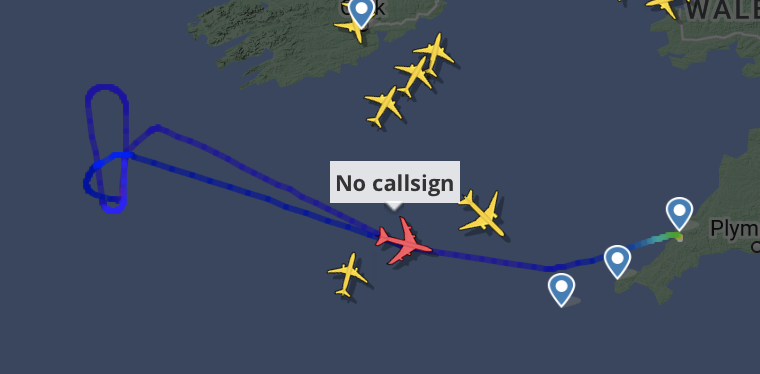
Monday 9 January 2023 23:45 , Andrew Griffin
Frustration over the poor quality of the feed is continuing to grow.
This coverage is diabolical! What a let down 😂 it’s the equivalent of being on hold but on the Tele with crappy music and a diagram that is just a line over the sea. At least it’s made me laugh #VirginOrbit 🚀
— Natalie-Eve Williams (@natalieeveradio) January 9, 2023
Historically, Virgin Orbit and Virgin Galactic have been very keen on using these live streams for marketing, showing a wide variety of products as well owner Richard Branson.
But they’ve also always been less spectacular than those run by Nasa and rivals SpaceX, presumably in part because those companies have so much more practice.
As a reminder, you can decide for yourself by watching the live feed here:
Mission has failed
Monday 9 January 2023 23:47 , Andrew Griffin
Someone just appeared on the live stream to announce that the rocket suffered an “anomaly” that means it will fail to reach orbit.
No further information was given, but some was promised soon.
Until then it looks like the mission has failed.
Plane coming back to land
Monday 9 January 2023 23:52 , Andrew Griffin
The live stream is currently showing video of the ‘Cosmic Girl’ plane coming back to land at Newquay.

There’s been no further information given on the stream or anywhere else about what actually happened to the rocket.
‘Cosmic Girl’ arrives on the ground
Monday 9 January 2023 23:56 , Andrew Griffin
‘Cosmic Girl’ has touched back down at Spaceport Cornwall.
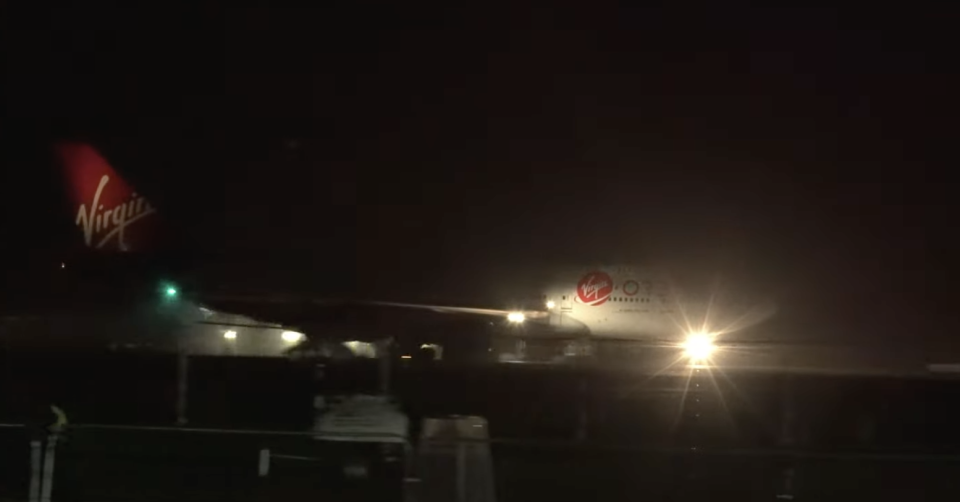
On the live stream, the company is hailing the success of the plane part of the mission.
But once more it is notably not giving any detail about what happened to the rocket, or how the mission failed.
Virgin Orbit deletes apparently false tweet about mission
00:00 , Andrew Griffin
Virgin Orbit had previously announced that the rocket had reached orbit, and that it was just waiting for final confirmation of the satellite payload being deployed. But it now says it is deleting that tweet, which appears to have been untrue.
As we find out more, we're removing our previous tweet about reaching orbit. We'll share more info when we can.
— Virgin Orbit (@VirginOrbit) January 9, 2023
Virgin Orbit ends live stream – with no information given
00:12 , Andrew Griffin
The already controversial live stream has already ended, with no further information given beyond the rocket having had an “anomaly”.
A mission controller appeared on screen to announce that the feed would be coming to an end.
“We have experienced an anomaly. And we are gathering more information,” he said, before thanking Virgin Orbit’s customers, staff and others involved in the launch.
“We’re going to be ending our live stream at this pint but please be sure to check our other channels – our social media channels – for more information as soon as it’s available.”
Virgin Orbit’s social media channels are yet to give any detailed information on what has gone wrong – or even exactly what happened at the end of the launch.
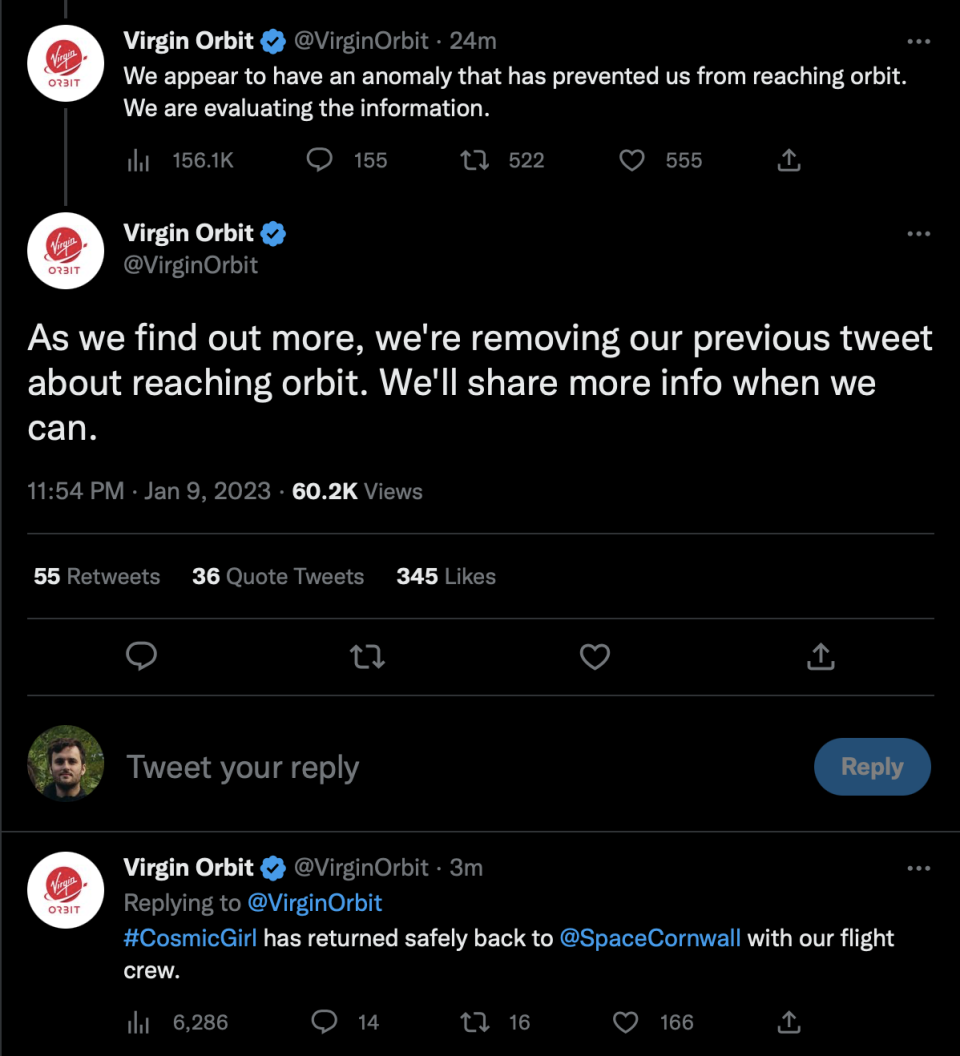
Launch appears to have gone wrong at the last moment
00:15 , Andrew Griffin
From both the live stream and people on the ground, it sounds like all of the mission went right until the very end. Technical problems appear to have meant that the payload isn’t in the right orbit.
That might explain the confusion in Virgin Orbit’s tweets: it’s possible that the satellites have made it into orbit, but not on the path needed. (If so they’ll likely be useless, and may well just burn up very quickly.)
Failed launch could bring embarrassment for politicians – and major money problems for Virgin Orbit
00:22 , Andrew Griffin
This was a very important launch for a lot of people, who have spent recent days playing up how much of a success it would be.
It could be embarrassing for the politicians who had hailed the launch as a major first step for their plans for the UK to become a space nation, with a range of space ports across the country and the ability to cheaply and easily launch new satellites. Business minister Grant Shapps had appeared during the live stream making such predictions.
But it could be outright worrying for Virgin Orbit itself. The company was spun out of Richard Branson’s private space company Virgin Galactic in 2017, with a whole host of hopes about how it could make a success of private satellite launches. Instead, it has struggled to make money, and its share price is down 80 per cent since it was listed last year.
Lots of people had been banking on today’s mission being a success, and the first of many. A lot of work will have to be done to try and save that future now.
00:33 , Andrew Griffin
Here’s the latest wrap from Reuters in Newquay, on where we are after what appears to have been a failed mission:
The first attempt to launch a satellite from western Europe appeared to have failed early on Tuesday when Virgin Orbit reported an “anomaly” that had prevented its rocket from reaching orbit.
The mission had left from the coastal town of Newquay in southwest England, with Virgin’s LauncherOne rocket carried under the wing of a modified Boeing 747 and later released over the Atlantic Ocean.
“We appear to have an anomaly that has prevented us from reaching orbit,” the company said. “We are evaluating the information.”
The apparent failure deals a further blow to European space ambitions after an Italian-built Vega-C rocket mission failed after lift-off from French Guiana in late December.
The rockets have since been grounded.
Virgin Orbit, part-owned by British billionaire Richard Branson, had planned to deploy nine small satellites into lower Earth orbit (LEO) in its first mission outside its United States base.
Launch officials were not immediately available for further comment. The company had earlier said on Twitter that LauncherOne had reached earth orbit, a tweet it later deleted.
A graphic display on an official video feed showed the mission at second-engine cut-off, three steps short of payload deployment about two hours after take-off.
The carrier aircraft, called “Cosmic Girl” returned to Newquay spaceport shortly after the rocket suffered the anomaly.
You can read our full story on the failure here.
Mission fails after ‘anomaly'
01:45 , Andrew Griffin
What was due to be a breakthrough mission for the UK, Europe, Richard Branson and his private satellite launch company ended in failure and confusion late on Monday night.
Virgin Orbit had intended to use a plane to carry a rocket up to 35,000 feet, before dropping it off to carry itself and its payload of nine satellites into space. It would have been the first ever rocket launch from UK soil, and the first satellites put into orbit from western Europe.
The company initially suggested that the mission had gone well and the satellites had been put into orbit. But soon after it said it had experienced an “anomaly”, that the payload had not made it after all – and the mission appeared to be a failure.
It could drastically harm the reputation of the fledgling UK space industry, the government that had publicly backed it, and Virgin Orbit, which had looked to be a pioneer and key participant in hopes for a boom for such companies in Britain.
But first engineers will have to work out what actually went wrong during the mission.
In a series of tweets, Virgin Orbit said: “We appear to have an anomaly that has prevented us from reaching orbit. We are evaluating the information.
“As we find out more, we’re removing our previous tweet about reaching orbit. We’ll share more info when we can.”
The plane, and its two pilots, made their way safely back to Spaceport Cornwall, in Newquay, soon after the mission’s failure was announced. They landed the converted former passenger plane on the same strip from which it had taken off just a couple of hours earlier.
But the mood of tense hope that marked the spectators as they set off had turned to confusion and frustration. Many had waited to watch the rocket as it left, and tens of thousands tuned in from home.
Even before the mission was declared a failure, those watching Virgin Orbit’s livestream had criticised the production, for failing to give a proper accounting of the mission’s progress alongside other stylistic and technical problems.
But at the end of that stream, a mission controller appeared on screen to announce that the mission had failed. He gave no further indication of what had happened – even when he returned again to announce the feed was over and to urge people to pay attention to Virgin Orbit’s other channels for any updates on what had happened.
At the time of writing, no such update was forthcoming. The company only said that it had failed to reach orbit, and that it would share more information as it became available.
On the ground, however, spectators suggested that the rocket had likely suffered issues during its final moments, and so failed to put the payload in the correct orbit. As such, those million-pound satellites were probably on their way to burning up high above the Earth, if they had not already.
Virgin Orbit stock falls after failed UK launch
03:14 , Vishwam Sankaran
Virgin Orbit’s stock took a plunge on Monday evening after its rocket failed to reach orbit due to “an anomaly.”
The company’s shares fell nearly 30 per cent during extended trading on Monday, dropping as much as below $1.40 per share.
Virgin Orbit’s mid-air launch system attempted to use a modified Boeing 747 to send nine satellites to space in a rocket that was dropped from under the plane’s wing mid-flight.
But about half an hour after the rocket was launched, the company announced on Twitter that the launch had “an anomaly” and that the satellites would not reach orbit.
'Rocket reached space but didn't reach required orbit'
03:30 , Vishwam Sankaran
Matt Archer, commercial space director at the UK Space Agency, said the rocket’s second stage suffered an “anomaly”.
He said the rocket’s first stage burn would have got it into basic orbit, but added that a second stage was needed to put it 500km above the Earth.
“That didn’t happen tonight and what you have seen is that it has reached space but hasn’t reached the required orbit,” Mr Archer explained, adding that an investigation in the following days will help understand what caused that technical failure.
“In effect, the rocket has not reached the required altitude to maintain its orbit or deploy the satellites, and therefore the mission was unsuccessful,” he said.
'Team resilient and would recover from set back'
03:45 , Vishwam Sankaran
Melissa Thorpe, head of Spaceport Cornwall, told PA that the launch team was “resilient,” and would recover from the failed mission.
“We’re feeling awful, to be honest – I’m not going to lie. It’s gutting and we all heard at different times and when we got together there were tears, and it was very upsetting,” Ms Thorpe told reporters.
“We are family and we’ve been through a lot together. So, when you go through something like this as a family at least you have that support, and we all understand one another,” she said.
Ms Thorpe said the horizontal launch part of the mission had gone to plan, adding that she was confident they can embark on another mission.
“This isn’t the first time we’ve been knocked, this is the biggest definitely, but I feel okay and we’ll get up and we’ll go again,” she said.
Launch failure may cause further problems for Virgin Orbit – report
04:15 , Vishwam Sankaran
Virgin Orbit previously reached orbit on four of its first five attempts.
But the failure to launch its rocket successfully into orbit yesterday may prove “disastrous” for the company, according to Eric Berger of Ars Technica.
He said this may prove to be a “devastating” launch failure for Virgin Orbit.
Virgin Orbit's LauncherOne vehicle now has four successes out of six launch attempts. This is not a terrible record for a startup at all. But a failure on a high profile mission, with a company in a precarious financial position, may prove disastrous.
— Eric Berger (@SciGuySpace) January 10, 2023
“This is not a terrible record for a startup at all. But a failure on a high profile mission, with a company in a precarious financial position, may prove disastrous,” Mr Berger tweeted.
'Virgin Orbit's horizonal launch had gone to plan'
04:43 , Vishwam Sankaran
Although Virgin Orbit’s Start Me Up mission to launch nine satellites into orbit failed due to “an anomaly” yesterday, Melissa Thorpe, head of Spaceport Cornwall, said the company’s horizonal launch had gone to plan.
In the mid-air launch system, the company used a modified Boeing 747 to carry the rocket up to 35,000 feet, before dropping it off to carry its satellites into space.
But more than half an hour after the rocket’s first stage did its job, the company said “an anomaly” has seemingly prevented the rocket from reaching its planned orbit.
“We’ll see how things look over the next little bit. We’re here and we’ve got our licence so it would be great to do it again soon,” Ms Thorpe told reporters.
“With any kind of failure it’s how you react to it and for us to get right back up again and we’re still passionate about what we do,” she added
UK science minister thanks teams involved in launch
05:39 , Vishwam Sankaran
Science minister George Freeman thanked the flight, ground crew, mission control team involved in the Virgin Orbit rocket launch.
“After a successful launch, rocket fire, release & entry into space, Virgin Orbit reported a problem with orbit trajectory,” he said.
“Gutting,” Mr Freeman tweeted, sharing a John F Kennedy quote “We do these things not because they are easy but because they are hard.”
ICYMI: What happened in moments leading to Virgin Orbit mission's 'anomaly'
05:52 , Vishwam Sankaran
Virgin Orbit’s rocket carrier plane, dubbed Cosmic Girl, lifted off from Spaceport Cornwall at 22:02 GMT on schedule.
The modified Boeing 747 plane dropped the company’s 21-meter-long LauncherOne rocket about an hour later when it was off Ireland’s southwest coast.
Virgin Orbit’s live telecast suggested that the rocket’s first stage successfully ignited, and its two stages separated over 3 minutes after the drop.
A few minutes following this, Chris Relf the company’s director of systems engineering and verification said LauncherOne seemingly “suffered an anomaly, which will prevent us from making orbit this mission.”
The mission’s failure has resulted in the loss of nine satellites, including several UK defense cubesats
‘We will return to orbit as soon as we complete full investigation,’ Virgin Orbit chief
06:03 , Vishwam Sankaran
Virgin Orbit boss Dan Hart said in a statement that the “first-time nature of the mission” added layers of complexity.
“While we are very proud of the many things that we successfully achieved as part of this mission, we are mindful that we failed to provide our customers with the launch service they deserve,” he said.
“We will work tirelessly to understand the nature of the failure, make corrective actions, and return to orbit as soon as we have completed a full investigation and mission assurance process,” Mr Hart added.
Anomaly occurred during rocket's second stage engine firing, Virgin Orbit says
06:32 , Vishwam Sankaran
Following the rocket’s release from Virgin Orbit’s customized 747 and ignition of its engines, it quickly went hypersonic and successfully reached space and continued through stage separation.
But “at some point” during the rocket’s second stage engine firing, the system experienced an anomaly while travelling at a speed of more than 17,000 kph (11,000 miles per hour), ending the mission, Virgin Orbit said in an official statement.
“We have shown the UK is capable of launching into orbit, but the launch was not successful in reaching the required orbit. We will work closely with Virgin Orbit as they investigate what caused the anomaly in the coming days and weeks,” Matt Archer, Director of Commercial Spaceflight at the UK Space Agency, said.
What launch failure could mean for Virgin Orbit
07:19 , Vishwam Sankaran
Before Monday’s failed attempt, Virgin Orbit had nailed four of its first five attempts.
While this is a good record overall for a startup space launch company, the company is reportedly still yet to reach a high number of yearly missions.
The space company conducted two launches in 2022, but the number was short of its forecast for four to six missions at the beginning of last year, according to CNBC.
Yesterday’s launch was an opportunity for the company to show its investors it was capable of, but its failure has led to its stocks plunging as much as below $1.40/share (-30 per cent) in after-hours trading.
“While we are very proud of the many things that we successfully achieved as part of this mission, we are mindful that we failed to provide our customers with the launch service they deserve,” Virgin Orbit chief Dan Heart said in a statement.
“We will work tirelessly to understand the nature of the failure, make corrective actions, and return to orbit as soon as we have completed a full investigation and mission assurance process,” he added.
Rocket burned up in atmosphere after launch failure – report
07:48 , Vishwam Sankaran
Virgin Orbit’s rocket and the nine satellites it was carrying to low-Earth orbit reportedly burned up in the atmosphere after the launch failed.
The rocket, which was projected to land over water, burned up in Earth’s atmosphere on reentry, according to New Scientist.
Virgin Orbit said in a statement that “at some point” during the firing of the rocket’s second stage engine, the system experienced “an anomaly,” that ended the mission prematurely.
Although the mission did not achieve its final orbit, the company said its feat still represents an important step forward.
“Today we inspired millions, and we will continue to look to inspire millions more. Not just with our ambition but also with our fortitude. Yes, space is hard, but we are only just getting started,” Melissa Thorpe, Head of Spaceport Cornwall said.
Nine small satellites lost in Virgin Orbit launch failure
08:06 , Vishwam Sankaran
Virgin Orbit’s rocket launch failure has resulted in the loss of the nine small satellites it was carrying.
The payloads included small UK defense satellites, one for studying space weather and another studying the ionosphere as well as a navigation satellite co-funded by the European Space Agency.
The satellites were insured, according to the BBC, suggesting the manufacturers and operators will likely be compensated.
“While we are very proud of the many things that we successfully achieved as part of this mission, we are mindful that we failed to provide our customers with the launch service they deserve,” Virgin Orbit chief Dan Heart said in a statement.
Virgin Orbit shares fall by nearly third after rocket failure
08:45 , Vishwam Sankaran
Virgin Orbit is presently trading at $1.39, with its shares falling by nearly a third – a loss of over $200m.
The company’s stock took a plunge as much as below $1.40 per share in after-hour trading yesterday after its rocket failed to reach orbit due to “an anomaly.”
While the mission did not achieve its final orbit, Virgin Orbit said its feat still represents an important step forward.
“We will work tirelessly to understand the nature of the failure, make corrective actions, and return to orbit as soon as we have completed a full investigation and mission assurance process,” Virgin Orbit chief Dan Hart said.
'Don't know what caused anomaly,' space agency head says
08:54 , Vishwam Sankaran
Matt Archer, Director of Commercial Spaceflight at the UK Space Agency, said the agency would work with Virgin Orbit to understand what went wrong with the launch.
“Over the coming days we will work closely with Virgin Orbit as they investigate what caused the anomaly,” Mr Archer said in a statement.
“Currently we don’t know what caused the anomaly,” he said adding that despite the failure, the project has succeeded in creating a horizontal launch capability at Spaceport Cornwall.
There may be another launch at Spaceport Cornwall later this year: Virgin Orbit chief
09:05 , Vishwam Sankaran
Virgin Orbit chief Dan Hart had said before the launch that company may be back at Spaceport Cornwall later in 2023.
“We’re excited about the future and coming back, maybe as soon as later this year, to launch again and hopefully get a rhythm going,” Mr Hart said at a pre-launch press conference.
“We want to be a part of the fabric of the space community here in the U.K. as well as globally. That’s our objective as a company,” he said.
Following the failed launch, the Virgin Orbit chief said the “first-time nature” of the mission added layers of complexity.
“We will work tirelessly to understand the nature of the failure, make corrective actions, and return to orbit as soon as we have completed a full investigation and mission assurance process,” he said in a statement.
Failure of Virgin Orbit launch to reach orbit 'disappointing', space agency head says.
09:27 , Vishwam Sankaran
The UK Space Agency’s Director of Commercial Spaceflight Matt Archer said the Virgin Orbit rocket launch result was “disappointing”.
While the mission could launch the rocket into orbit, it was “not successful in reaching the required orbit”, he explained.
Mr Archer added that the UK remains committed to becoming the leading provider of commercial small satellite launches in Europe by 2030, “with vertical launches planned from Scotland”.
More on the space agency head’s statement here.
‘Great thing no-one was harmed,’ UK Business Secretary says
09:54 , Vishwam Sankaran
UK Business Secretary Grant Shapps expressed hope that the teams behind yesterday’s failed launch would “go again once they find out what exactly went wrong.”
“The great thing about this technology is that no-one was harmed. The pilots came back in the aircraft,” he told Sky News.
“Space is difficult,” Mr Shapps said, adding that it a “big moment” yesterday nonetheless.
ICYMI: Timeline of events that led to Virgin Orbit mission's 'anomaly'
10:32 , Vishwam Sankaran
The jumbo jet Cosmic Girl carrying Virgin Orbit’s rocket lifted off from Spaceport Cornwall at 22:02 GMT on schedule, and flew to 35,000ft over the Atlantic Ocean.
It then released the 21-meter-long rocket about an hour later off Ireland’s southwest coast.
The company’s live telecast said the rocket’s first stage successfully ignited, and its two stages separated over three minutes after the drop.
But a few minutes after the rocket’s upper stage finished a nearly five-minute burn, Virgin Orbit announced that something had gone wrong.

The UK’s first ever space launch has failed
“We appear to have an anomaly that has prevented us from reaching orbit. We are evaluating the information. As we find out more, we’re removing our previous tweet about reaching orbit. We’ll share more info when we can,” the space company tweeted.
“At some point during the firing of the rocket’s second stage engine and with the rocket travelling at a speed of more than 11,000 miles per hour, the system experienced an anomaly, ending the mission prematurely,” Virgin Orbit later said in a statement.
The plane returned to Spaceport Cornwall safely as engineers attempted to establish what went wrong.
“This isn’t the first time we’ve been knocked, this is the biggest definitely, but I feel okay and we’ll get up and we’ll go again,” Melissa Thorpe, head of Spaceport Cornwall, said.
Two more sites in UK currently being developed for space launch
10:45 , Vishwam Sankaran
Two more places in the UK are reportedly in the final stages of space launch preparations.
SpaceHub Sutherland in Scotland and SaxaVord Spaceport off the Scottish coast are being developed to serve vertical micro-rocket launches, according to Space.com.
Spaceport Cornwall chief Melisa Thorpe said it cost £20 million ($24 million) to prepare the Newquay airport for the Virgin Orbit launch.
The UK Space Agency has reportedly provided funding for seven sites overall in 2017 to make space-related upgrades.
Indian billionaire hails India's space agency after Virgin Orbit launch failure
11:07 , Vishwam Sankaran
Indian billionaire Anand Mahindra, chairman of Mahindra Group, hailed the record of the Indian Space Research Organisation (ISRO) on Twitter following the failure of the Virgin Orbit mission.
“I recognise that this was a very different type of orbital launch but it stills tells me how much more we should appreciate and admire the launch record of ISRO,” he said.
Virgin Orbit’s mission was planned to be the first-ever rocket to launch from UK soil, as well as the first one carrying satellites to be launched from Western Europe into space.
I recognise that this was a very different type of orbital launch but it stills tells me how much more we should appreciate and admire the launch record of @isro https://t.co/K48TrE5VLy
— anand mahindra (@anandmahindra) January 10, 2023
Unlike conventional rockets launched from a launchpad, the company’s mid-air launch system used a modified Boeing 747 to carry its rocket up to 35,000 feet, before releasing it off to carry its satellites into orbit.
But about an hour after the rocket’s release, the company said “an anomaly” appeared to prevent the rocket from reaching its planned orbit.
“Launching a spacecraft always carries significant risks. Despite this, the project has succeeded in creating a horizontal launch capability at Spaceport Cornwall,” Matt Archer, the UK space agency’s director of commercial spaceflight said.
Oman’s satellite mission faces setback with Virgin Orbit launch failure
11:26 , Vishwam Sankaran
Oman’s first-ever orbital mission faces a setback with the failure of Virgin Orbit’s rocket launch mission from the UK.
The Arab country’s satellite, Aman, developed to collect high-resolution satellite photos of Earth, was one of the payloads carried by Virgin Orbit’s LauncherOne rocket.
The satellite was reportedly a product of collaboration between the Sultanate of Oman, the US, and Poland.
However, the rocket launch failure has resulted in the loss of the nine small satellites it was carrying.
The BBC reported that the satellites were insured, suggesting the manufacturers will likely be compensated.
UK minister called out for seemingly editing out Boris Johnson in Virgin Orbit photo
11:51 , Vishwam Sankaran
Twitter users have called out UK Business Secretary Grant Shapps for seemingly editing out former British prime minister Boris Johnson from a photo he recently shared.
The photo seems sourced from a Virgin Orbit post in June 2022 where then UK prime minister, Mr Johnson, can be clearly seen.
We’re happy to report we’ll have the @NatReconOfc onboard a joint mission between the UK and the US later this year in a historic flight out of @SpaceCornwall! This will be the first-ever orbital launch from British soil.🚀 More: https://t.co/EWX5IPXBdy pic.twitter.com/sHVKpOKJAm
— Virgin Orbit (@VirginOrbit) June 29, 2022
However, in Mr Shapp’s now-deleted post, prior to Virgin Orbit’s Monday launch, the former prime minister is seemingly “photoshopped” out as several Twitter users pointed out.
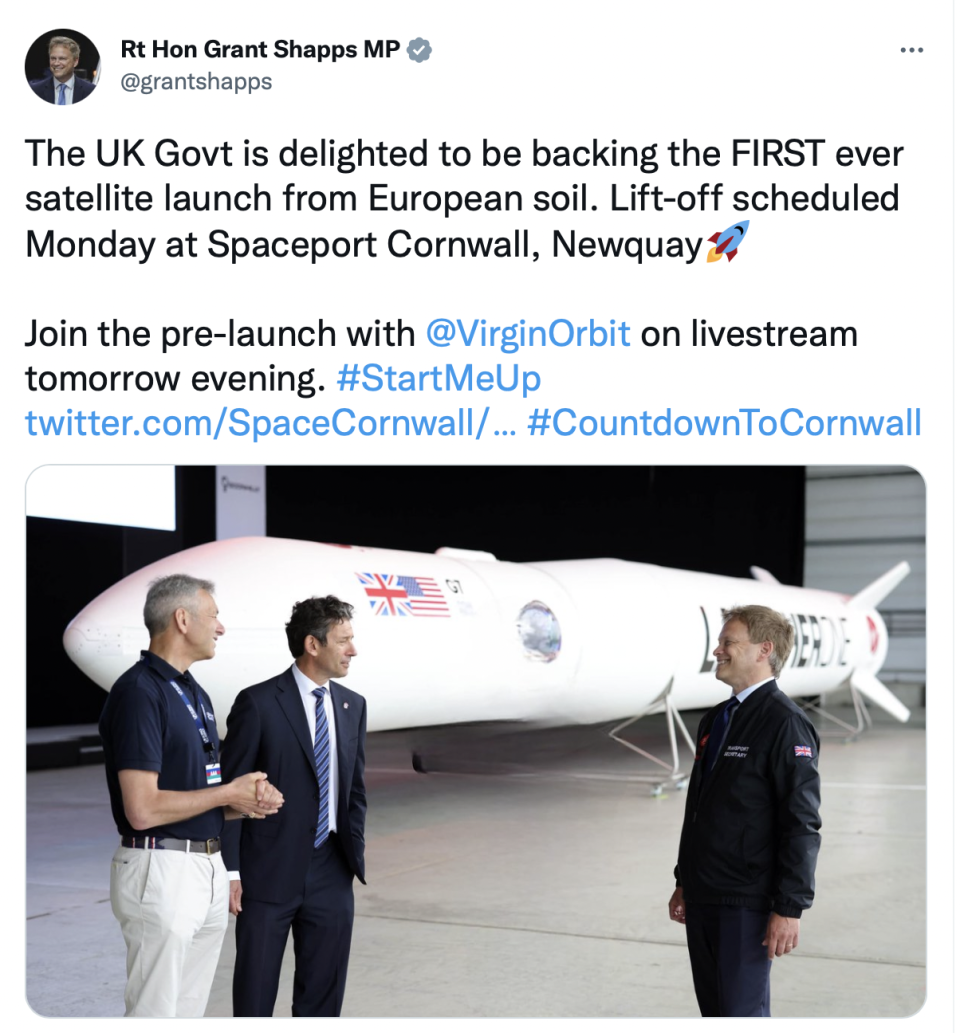
Local MP says failure was ‘disappointing’ but hails ‘great achievement
12:48 , Andrew Griffin
“This is a great achievement by all involved and a huge milestone in the UK’s journey into space.
“I am immensely proud of everyone who made this incredible moment happen, especially the team at Spaceport Cornwall, Newquay Airport and Cornwall Council as well as the UK Space Agency and Civil Aviation Authority.
“Of course, I want to thank Virgin Orbit as well as numerous Government ministers over the years and particularly Boris Johnson, who while PM was an enthusiastic supporter of this project. It’s been a real team effort and shows just what is possible when we all pull together.
“The launch is not only a giant leap for the UK, but the Duchy and Cornish space sector as Spaceport Cornwall is transforming our local economy by bringing in investment and creating well-paid jobs as well as inspiring millions of people.
“It has now also placed Cornwall at the centre of UK’s space programme and shows just what we can achieve. I look forward to seeing what happens next and am excited for the future of the space industry in Cornwall and the UK.”
“For now, we have so much to be proud of and have shown the world that we can successfully launch from Spaceport Cornwall into space.“This is a great achievement by all involved and a huge milestone in the UK’s journey into space.
“I am immensely proud of everyone who made this incredible moment happen, especially the team at Spaceport Cornwall, Newquay Airport and Cornwall Council as well as the UK Space Agency and Civil Aviation Authority.
“Of course, I want to thank Virgin Orbit as well as numerous Government ministers over the years and particularly Boris Johnson, who while PM was an enthusiastic supporter of this project. It’s been a real team effort and shows just what is possible when we all pull together.
“The launch is not only a giant leap for the UK, but the Duchy and Cornish space sector as Spaceport Cornwall is transforming our local economy by bringing in investment and creating well-paid jobs as well as inspiring millions of people.
“It has now also placed Cornwall at the centre of UK’s space programme and shows just what we can achieve. I look forward to seeing what happens next and am excited for the future of the space industry in Cornwall and the UK.”
“For now, we have so much to be proud of and have shown the world that we can successfully launch from Spaceport Cornwall into space.
Payload was ‘insured’ and Virgin Orbit should recover losses, space agency says
14:10 , Andrew Griffin
Matt Archer, from the UK Space Agency, has said that the satellite load was insured, that Virgin Orbit should recover its losses, and the satellites will break up and what is left should crash into the ocean.
“The rocket will probably break up, not all of it will burn up, but certainly that’s what they will be tracking at the moment and making sure that it is coming down safely,” he said.
“The trajectory that it was on shouldn’t be anywhere near land.”
Mr Archer said the first stage burn would have got the rocket into basic orbit but a second stage was needed to put it 500km above the earth
“That didn’t happen tonight and what you have seen is that it has reached space but hasn’t reached the required orbit,” he said.
“While it is obviously disappointing that the mission wasn’t successful, actually we’re really proud of the fact that we’ve delivered so much here and we’ve created the conditions for launch here.
“We’ve seen that we can do it and we will look to do it again.”
Matt Archer, from the UK Space Agency, said the satellite load was insured and Virgin Orbit would recover its losses.
Rival and fellow space launch company Orbit sends sympathies – and highlights its own technology
16:07 , Andrew Griffin
Orbex Space is another of the companies hoping to start launches from the UK, and turn it into a space nation. The company has addressed Virgin Orbit’s failure in tweets – but also used the opportunity to highlight its own technology, which relies on more traditional “vertical” rockets.
We were sorry to learn that US launch firm @VirginOrbit’s first horizontal orbital space launch from the UK did not go as planned. We know how much time & energy has been invested to deliver that launch attempt & wish the team well for their next mission (1/2)
— Orbex Space (@orbexspace) January 10, 2023
Meanwhile we look forward to introducing the UK to vertical orbital launches with the debut of our environmentally-friendly rocket Prime, launching from our own pad at Sutherland Spaceport in the near future. #LaunchUK (2/2) pic.twitter.com/sbIWbllenI
— Orbex Space (@orbexspace) January 10, 2023

